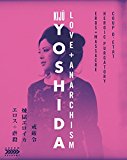| Reviews & Columns |
|
Reviews DVD TV on DVD Blu-ray 4K UHD International DVDs In Theaters Reviews by Studio Video Games Features Collector Series DVDs Easter Egg Database Interviews DVD Talk Radio Feature Articles Columns Anime Talk DVD Savant Horror DVDs The M.O.D. Squad Art House HD Talk Silent DVD
|
DVD Talk Forum |
|
|
| Resources |
|
DVD Price Search Customer Service #'s RCE Info Links |
|
Columns
|
|
|
Kiju Yoshida: Love + Anarchism (Eros + Massacre / Heroic Purgatory / Coup d'Etat)
The Movie:
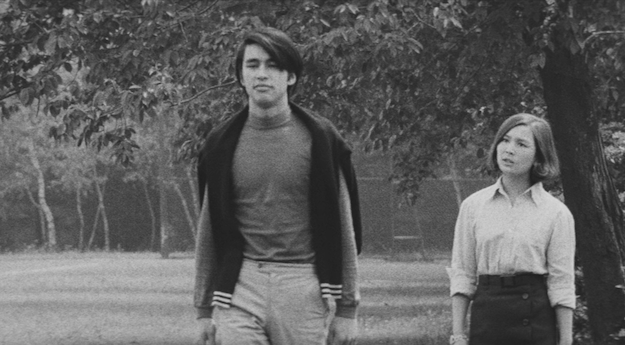
Arrow Video's new limited edition box set Kiju Yoshida: Love + Anarchism presents an unofficial trilogy of films about Japanese political radicalism, as refracted through the lens of the set's titular subjects. In these three films, director Kiju Yoshida (known alternately as Yoshishige, for reasons not totally made clear in my online research) demolishes narrative expectations while emphasizing an unbalanced graphic style that is striking and unnerving. He is considered a member of the Japanese New Wave, but even by their avant-garde standards, the films in Love + Anarchism are brazenly experimental. Some readers will take that description as a warning, but I hope you're the kind of viewer who boldly takes it as a challenge, because these are powerful, if admittedly puzzling, films.
First in the set is the 1969 epic Eros + Massacre, often dubbed as Yoshida's masterpiece and sometimes characterized as his most accessible film. That said, it's an irreverently fragmented and poetically contemplative work in which the emotional and sexual ennui of two modern-day students, one a part-time prostitute (Toshiko Ii) and the other an impotent filmmaker (Daijiro Harada), is juxtaposed with a politically charged romantic quadrangle from the early 20th Century. Sakae Osugi (played in the film by Toshiyuki Hosokawa) was an anarchist whose desire for total freedom led him to become a free love advocate. In addition to his wife, Osugi also kept a mistress (called Itsuko in the film, and played by Yuko Kusonoki). Although Osugi's theory of functioning free love includes financial independence, we learn that he depends upon Itsuko for support. He also becomes infatuated with Noe Ito (Mariko Okada), the young editor of the feminist Bluestocking magazine.
Arrow offers up two versions of Eros + Massacre, the 166-minute theatrical release and the 216-minute director's cut. The edits to the theatrical version were not so much for commercial concerns but rather due to pressure from Ichiko Kamichika, the woman upon whom the character of Itsuko was based. Kamichika stabbed Osugi in 1916, and served time in prison for the crime, but was a prominent politician at the time the film was made in the late '60s. Even with many scenes relating to Itsuko removed from the shorter version, the final quarter of the film in both cuts plays and re-plays the fabled stabbing, pseudo-Rashomon-style, with the event reimagined in different scenarios with varying levels of emotional intensity. In fact, while both versions have their merits, my preference for the director's cut almost entirely hinges upon the inclusion of a gorgeously vertiginous shot of a frantic Itsuko running through rooms, being encircled by the camera, as an injured Osugi pursues her like a zombie.
Kusonoki's portrayal of Itsuko is utterly memorable, the character's bitterness informed by her complex intelligence rather than rash jealousy. Even so, Mariko Okada (Yoshida's real-life wife), as Noe Ito, arguably maintains the emotional center of the film. Noe is the character who most intensely connects to Osugi's ideology and idealism, but she is also clear-eyed enough to see Osugi's failings, a trait which is echoed by the disillusioned would-be idealists in the present-day sections of the film.
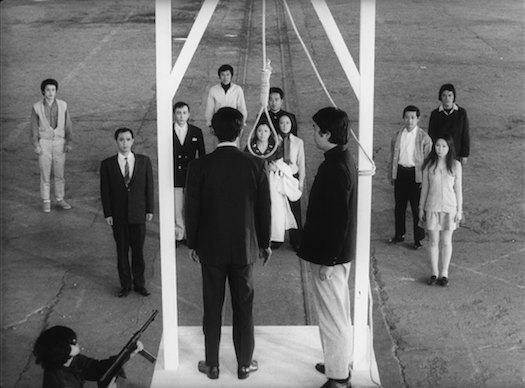
Okada is also the emotional center of 1970's Heroic Purgatory, which is easily the most elusive film in this trilogy. In the first scene, Okada brings home a runaway teenager whom she has just seen leap to her death (it didn't take, apparently). Her husband, a regretful scientist, is reminded of his youthful membership in a Communist revolutionary group. From there, the couple cope with their imperfect middle-class present and their turbulent activist past. Betrayal and squandered idealism recur as thematic motifs. The boundaries between past, present, and future fracture.
As countless viewers wrestle with new episodes of Twin Peaks while I type this, it's hard not to draw comparisons between this film and the work of David Lynch. Like Lynch's work, this film can be characterized by scenes of surreal horror, sequences that flow into each other with an elliptical dream logic, overall narrative opaqueness, and a persistent undercurrent of trauma. Anyone who casts a literal eye upon Heroic Purgatory is going to end up with a headache. But is it harder to sit through than Inland Empire? Hardly.
The de-emphasis of conventional narrative allows viewers to most fully appreciate Yoshida's visual style, present throughout the trilogy, but most intensely realized in this film. For example, Yoshida frequently places faces on the edge of the frame or in the corner, while characters are overwhelmed by graphic elements in their surroundings. Yoshida also never constructs a sequence in the widely used shot/reverse shot style almost every narrative filmmaker relies upon. His camera placement and editing often break the 180-degree rule, distorting and fracturing spaces in ways that are visually stunning and sometimes quite disorienting. Yoshida's choices may not seem "motivated" in the pragmatic way that most films are shot, but they are not empty flourishes either.
I had to go back and examine a few sequences from the last film in the set, 1973's Coup d'État, because I assumed Yoshida had chosen a more conventional shooting style. This is not the case, by a long shot. Even though Coup D'état is the easiest film in the trilogy to follow, thanks to a fairly straightforward narrative style, Yoshida's selection of images remains defiantly off-center. To these eyes, it's the most satisfying synthesis of Yoshida's many gifts as a director: an unparalleled visual sense, an interest in psychological complexity, and great taste in actors.
Kwaidan's Rentaro Mikuni commands the screen as Ikki Kita, an influential intellectual whose right-wing writings were instrumental in inspiring a series of political assassinations and an infamous attempted coup on February 26, 1936.
Unsurprisingly, Yoshida is little interested in staging these well-documented large-scale events. Similarly, he avoids banalities like pausing to inform viewers when several months or years have passed. He just narrows his focus like a laser beam on Kita's shifting state of mind. Kita philosophizes and plots to realize his dream of martial law. He cuts himself with a razor to counteract feelings of apprehension and fear. He mentors a young soldier, who struggles to find meaning in his life and hopes that Kita's vision of Japan will provide that meaning.
Mikuni invests Kita with a Lear-like blend of gravitas and madness so that when we witness his inevitable downfall, the tragedy reverberates.
It's interesting to watch these films as a trilogy, not only for the ways they echo each other, but for the ways they diverge. All three are clearly the product of the same filmmaker, but each makes for a wildly different, wholly essential viewing experience. If you're an art cinema know-it-all, and you've never heard of Yoshida (as I hadn't), your cred is officially in question.
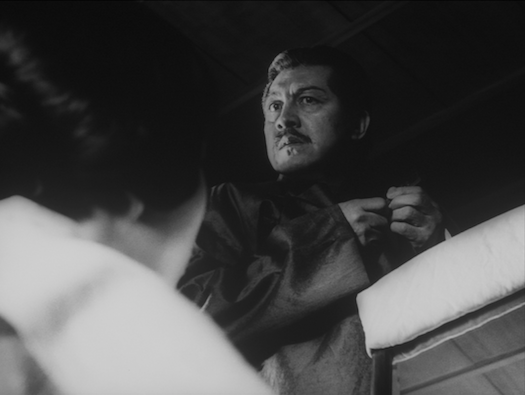
The Blu-ray
Kiju Yoshida: Love + Anarchism comes in a limited edition of 3000 copies. Arrow's box contains 7 discs: 3 Blu-rays, with the two cuts of Eros + Massacre on their own dedicated discs and Heroic Purgatory and Coup D'état sharing the third, plus 4 DVDs, with each film separate. The Blu-ray Discs are Region Free. Also included is a small 76-page book including essays on Yoshida's work by David Desser, Isolde Standish, and Dick Stegewerns.
The Video:
Arrow offers a strong and seemingly accurate reproduction of these atypically photographed films. All three are AVC-encoded 1080p presentations, with the two cuts of Eros + Massacre framed at a 2.35:1 aspect ratio and the other two films at the 1.37:1 Academy ratio. All three films tend to be high-contrast, with all detail on the bright and dark side of the spectrum intentionally disappearing. The director's cut of Eros + Massacre is generally brighter and looks more pushed or over-exposed than the theatrical cut. There's no discussion of this difference in the film's supplements, but considering the visceral impact created by the overexposure, I would not be surprised if Yoshida genuinely preferred the unpredictable idiosyncrasy of the brighter look, and it had actually been restored for his director's cut. Just conjecture, but I'd like to believe that. Otherwise, the films are clean and clear. Just some minor dirt and some reel-change "cigarette burns," plus some splices in the theatrical cut that make it apparent to the keen-eyed where material has been removed, but you'd really have to be looking for that stuff. No major digital flaws, and film grain is nicely resolved.
The Audio:
All three films have lossless Japanese LPCM mono audio tracks (with optional English subtitles). Yoshida sometimes utilizes unconventional sonic elements, like an intermittent Moog score on Coup D'état, but for the most part, the sound design is straightforward. The original audio is somewhat limited by its age, but the digital transfer contains no glaring flaws.
Special Features:
(HD, 11:30 total) - Recorded in 2008, Yoshida discusses the historical and political elements that informed and inspired these films. Each one runs roughly 6 minutes and feature some spoilers, but they might prove a useful enough primer for folks going into these films without a background in Japanese history that sacrificing those few minor surprises could be worth it.
Final Thoughts:
The films of Kiju Yoshida require a certain amount of effort from viewers, which is going to make them an immediate turn-off for some. But for viewers that would embrace the challenge of using their imagination to see what exists between the cuts, figuring out which images require decoding and which ones can remain powerful mysteries, or even just focusing in on the emotions of the performances to guide them through a confusing narrative, the three films in the Love + Anarchism box set have the potential to be life-changers. Highly Recommended.
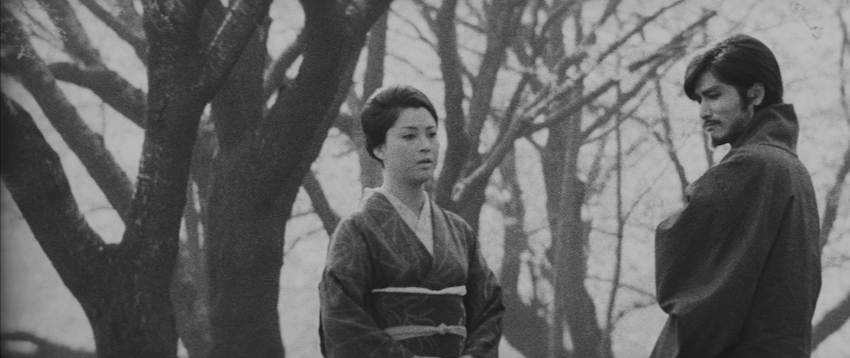
Justin Remer is a frequent wearer of beards. His new album of experimental ambient music, Joyce, is available on Bandcamp, Spotify, Apple, and wherever else fine music is enjoyed. He directed a folk-rock documentary called Making Lovers & Dollars, which is now streaming. He also can found be found online reading short stories and rambling about pop music.
|
| Popular Reviews |
| Sponsored Links |
|
|
| Sponsored Links |
|
|
| Release List | Reviews | Shop | Newsletter | Forum | DVD Giveaways | Blu-Ray | Advertise |
|
Copyright 2024 DVDTalk.com All Rights Reserved. Legal Info, Privacy Policy, Terms of Use,
Manage Preferences,
Your Privacy Choices | |||||||









